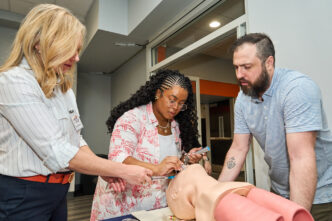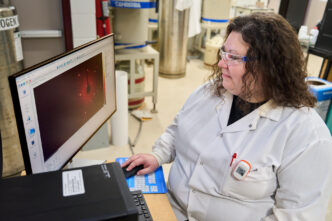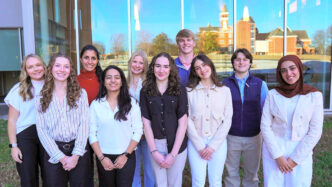
CLEMSON — Saara DeWalt, whose research extends from Clemson to the far corners of the globe, has been named chair of the department of biological sciences in the College of Science at Clemson University.
DeWalt, a professor in biological sciences, has been serving as interim chair since Oct. 1, 2018. DeWalt’s appointment to chair is the result of a national search that attracted excellent external candidates. DeWalt stood out among the rest in the field.
“Over the past seven months, Dr. DeWalt has impressed me with her ability to engage faculty, staff and students; her commitment to mentoring and developing faculty and staff talent; and her success at improving operational effectiveness of the largest department on campus,” said Cynthia Y. Young, dean of the College of Science. “As chair, she will lead the department through the development and implementation of a strategic plan which is grounded in further strengthening our Clemson R1 culture and preparing the next generation of scientists. I look forward to her leadership.”
DeWalt is president-elect of the Association for Tropical Biology and Conservation (ATBC) and past subject editor for Biotropica, the journal of the ATBC. In 2017, DeWalt was presented with an Award of Excellence from the Clemson University board of trustees in the category of Top Publication. DeWalt’s collaborative paper, titled “Biomass Resilience of Neotropical Secondary Forests,” was published in the journal Nature.
Before becoming interim chair, DeWalt served several years as graduate program coordinator and chair of the Graduate Advisory Committee in biological sciences. She also was on the team that helped develop ClemsonFORWARD graduate education goals and strategies. Last year, she was selected and participated in the Provost’s Trailblazers Mentoring Initiative, a program through TIGERS ADVANCE that seeks to promote gender equity, retention and support across campus. DeWalt led the development of a faculty mentoring plan for her department and the college.
“I am thrilled to have been selected to lead the department of biological sciences,” DeWalt said. “I will be focused on continuing to build our department of innovative researchers, talented and dedicated teachers, amazing staff and creative and hard-working students. We have the best and brightest undergraduate students in our majors of biological sciences and microbiology. I am committed to providing them the best education filled with unique research and learning opportunities.”
For more than 20 years, DeWalt has been conducting ecological research around the world, including Hawaii, Costa Rica, Dominica, Brazil, Malaysia and Australia. She will be adding Madagascar to her list this summer when she attends the annual meeting of the ATBC. Her recent research activities are focused on understanding plant invasions in temperate and tropical forests, dynamics of hurricane-affected forests in the Caribbean and rates of biodiversity recovery in second-growth tropical forests.

“My main area of research is to determine why certain plants are relatively rare where they are native but become such problems where they’ve been introduced,” DeWalt said. “My students and I have examined various ways to control these weeds using what we learn from the native range. I love studying forested ecosystems – be they in Hawaii, Costa Rica or South Carolina. I want to know how forests work and why some exotic plants can proliferate in them.”
DeWalt received her Bachelor of Arts in biology at Brown University (1994) and her Ph.D. in biological sciences with a minor in experimental statistics at Louisiana State University (2003). She spent two years as a Huxley Research Fellow at Rice University before joining the faculty at Clemson as an assistant professor in 2005.
DeWalt is an avid runner who also enjoys going on hikes in the Clemson Experimental Forest with her husband, Kalan Ickes, and their children, Owen, 11, and Sasha, 9.
When asked to envision the future of biological sciences under her leadership, DeWalt listed several goals:
- Be a research-intensive department that continues to provide a valuable and enriching student experience.
- Work together on a strategic plan that strengthens the department’s mission, develops research areas in which the department can be nationally and internationally known, and aligns with ClemsonFORWARD and ScienceFORWARD.
- Have graduate students at the center of the plan and work to strengthen the graduate programs in biological sciences, microbiology and environmental toxicology.
- Promote equity and further institutional diversity.








